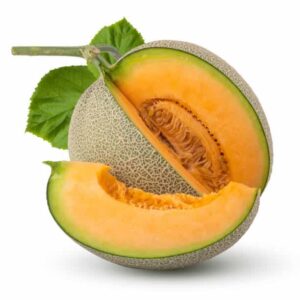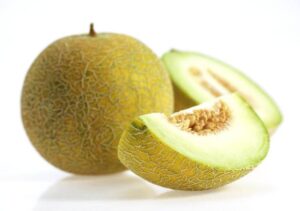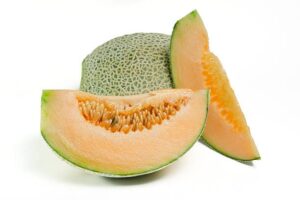Cucumis melo, commonly known as melon, is a delicious and nutritious fruit that belongs to the Cucurbitaceae family. It is widely cultivated and consumed worldwide due to its sweet and refreshing taste. Beyond its delightful flavor, melon offers numerous health benefits, making it a valuable addition to your diet. In this article, we will delve into the scientific research supporting Cucumis melo benefits.
Nutrient-Rich Composition
One of the key benefits of Cucumis melo consumption is its rich nutrient profile. Melons are a good source of essential vitamins, minerals, and antioxidants. They are particularly high in vitamin C, which is essential for a healthy immune system and skin health. A 100-gram serving of melon provides approximately 34% of the recommended daily intake of vitamin C. Moreover, melons contain vitamin A, vitamin K, vitamin B6, and folate, contributing to overall well-being.
Antioxidant Properties
Cucumis melo is packed with antioxidants, which play a crucial role in protecting the body against oxidative stress and chronic diseases. The presence of antioxidants like beta-carotene and lutein in melons has been shown to reduce the risk of age-related macular degeneration (AMD) and cataracts. These antioxidants also help neutralize harmful free radicals, reducing the risk of various chronic diseases, including cancer.
Furthermore, Cucumis melo stands out for its unique combination of antioxidants, such as zeaxanthin and cucurbitacin E. Zeaxanthin, specifically found in high levels in melons, contributes to eye health by protecting against oxidative damage and inflammation. Additionally, cucurbitacin E, a bioactive compound present in Cucumis melo, has demonstrated anti-inflammatory and anticancer properties, further enhancing the fruit’s potential in promoting overall well-being and reducing the risk of various diseases associated with oxidative stress.
Hydration
 Melons are composed of approximately 90% water, making them an excellent choice for maintaining proper hydration levels. Staying adequately hydrated is essential for bodily functions, including digestion, circulation, and temperature regulation. Furthermore, the high water content in melons can promote a feeling of fullness, aiding in weight management by reducing calorie intake.
Melons are composed of approximately 90% water, making them an excellent choice for maintaining proper hydration levels. Staying adequately hydrated is essential for bodily functions, including digestion, circulation, and temperature regulation. Furthermore, the high water content in melons can promote a feeling of fullness, aiding in weight management by reducing calorie intake.
Beyond their high water content, these melons are rich in vitamins, minerals, and antioxidants, supporting overall health. The combination of water and essential nutrients in Cucumis melo varieties not only aids in maintaining hydration but also helps in curbing cravings for high-calorie snacks. Additionally, the natural sweetness of these melons can satisfy sweet cravings, making them a nutritious and refreshing alternative in a balanced diet for those aiming to manage their weight effectively.
Digestive Health
Fiber is a vital component of a healthy diet, and Cucumis melo provides a moderate amount of dietary fiber. Fiber aids in digestion, helps prevent constipation, and supports a healthy gut microbiome. A study published in the journal “Nutrients” in 2018 found that increased fruit consumption, including melon, was associated with a reduced risk of developing colorectal cancer, emphasizing the importance of fiber-rich foods in digestive health.
Not only does it provide essential dietary fiber, but it also contains enzymes like actinidin, which facilitate the breakdown of proteins in the digestive system. Also contains vitamins and minerals, such as vitamin C and potassium, which further support digestive functions.
Blood Pressure Regulation
 Potassium is an essential mineral found in melons that plays a crucial role in regulating blood pressure. Adequate potassium intake can help counteract the effects of sodium and lower blood pressure, reducing the risk of hypertension and cardiovascular diseases. A study published in the journal “Hypertension” in 2015 showed that a diet rich in potassium-containing foods, such as melon, can significantly reduce blood pressure levels.
Potassium is an essential mineral found in melons that plays a crucial role in regulating blood pressure. Adequate potassium intake can help counteract the effects of sodium and lower blood pressure, reducing the risk of hypertension and cardiovascular diseases. A study published in the journal “Hypertension” in 2015 showed that a diet rich in potassium-containing foods, such as melon, can significantly reduce blood pressure levels.
In addition to its rich potassium content, melons, particularly the Cucumis melo variety, boast additional attributes that contribute to effective blood pressure regulation. This fruit is a valuable source of vitamins, including vitamin C, which promotes the health of blood vessels and enhances their flexibility. Moreover, the natural hydration provided by melons can contribute to maintaining optimal blood volume, supporting overall cardiovascular function.
Skin Health
The vitamins and antioxidants in Cucumis melo can contribute to healthy and radiant skin. Vitamin C, in particular, supports collagen production, which is vital for skin elasticity and wrinkle prevention. Additionally, the hydration provided by the water content of melons helps maintain skin moisture, reducing the risk of dryness and promoting a youthful appearance.
Moreover, Cucumis melo is rich in beta-carotene, a precursor to vitamin A, which plays a crucial role in promoting skin cell regeneration and repairing damaged tissues. This not only aids in maintaining a healthy complexion but also contributes to the skin’s ability to recover from environmental stressors. Additionally, the anti-inflammatory properties of melons help soothe irritated skin, making them a valuable addition to a skincare regimen for individuals with sensitive or reactive skin.
Cancer Prevention
 Beyond its general health benefits, Cucumis melo has also been linked to cancer prevention. The presence of potent antioxidants, like beta-carotene and lutein, can help combat free radicals, which are known to damage DNA and potentially lead to cancerous cell mutations. A study published in the “Journal of Cancer Research and Clinical Oncology” in 2015 suggested that a diet rich in antioxidant-containing fruits, such as melon, could reduce the risk of certain types of cancers.
Beyond its general health benefits, Cucumis melo has also been linked to cancer prevention. The presence of potent antioxidants, like beta-carotene and lutein, can help combat free radicals, which are known to damage DNA and potentially lead to cancerous cell mutations. A study published in the “Journal of Cancer Research and Clinical Oncology” in 2015 suggested that a diet rich in antioxidant-containing fruits, such as melon, could reduce the risk of certain types of cancers.
Beyond the general antioxidant benefits, the specific combination of compounds found in Cucumis melo, such as cucurbitacins, phytoene, and phenolic acids, has demonstrated remarkable anti-cancer potential. These bioactive substances have been observed to exhibit anti-inflammatory and anti-proliferative effects, further contributing to the inhibition of cancerous cell growth. Additionally, melon’s rich content of vitamins C and A enhances the body’s immune response, providing an added layer of defense against cancer development.
Improves Heart Health
A heart-healthy diet often includes foods like melons due to their ability to improve cardiovascular health. The combination of potassium, fiber, and antioxidants in Cucumis melo can contribute to lower cholesterol levels and reduce the risk of heart disease. A study published in the “American Journal of Clinical Nutrition” in 2002 found that diets high in potassium-rich foods, like melon, were associated with a reduced risk of stroke.
Supports Bone Health
Melon contains essential minerals like calcium and phosphorus, which are crucial for maintaining strong and healthy bones. Adequate calcium intake, in particular, is essential for preventing osteoporosis and bone fractures. While melon is not as rich in calcium as dairy products, it can still contribute to overall bone health when included in a balanced diet.
Moreover, Cucumis melo offers a unique advantage for bone health with its rich content of vitamin K. Vitamin K plays a vital role in bone metabolism by enhancing calcium absorption and regulating bone mineralization. The combination of calcium, phosphorus, and vitamin K in melon makes it a valuable addition to your diet for promoting optimal bone density and reducing the risk of bone-related issues.
Boosts Immune Function
 The high vitamin C content in Cucumis melo is not only essential for skin health but also plays a vital role in supporting the immune system. Vitamin C stimulates the production of white blood cells, which are responsible for defending the body against infections. A robust immune system is crucial for overall health, and regular consumption of melon can help maintain its function.
The high vitamin C content in Cucumis melo is not only essential for skin health but also plays a vital role in supporting the immune system. Vitamin C stimulates the production of white blood cells, which are responsible for defending the body against infections. A robust immune system is crucial for overall health, and regular consumption of melon can help maintain its function.
Furthermore, Cucumis melo stands out for its unique combination of antioxidants and phytonutrients, which work synergistically with vitamin C to enhance immune function. These compounds not only scavenge free radicals that can compromise the immune system but also contribute to the overall resilience of the body. The melon’s rich array of nutrients, including vitamins A and B6, along with essential minerals like potassium, further contribute to fortifying the immune response, making it an exceptional addition to a well-rounded, immune-supportive diet.
Aids in Weight Management
Cucumis melo is a low-calorie and low-fat fruit, making it an excellent choice for those looking to manage their weight. Its high water content, combined with fiber, provides a feeling of fullness, which can help reduce overall calorie intake. Additionally, the natural sweetness of melon can satisfy sugar cravings in a healthier way compared to high-calorie desserts.
Apart from being low in calories and fat, Cucumis melo stands out for its rich nutritional profile. This fruit is a good source of vitamins and minerals, including vitamin C, vitamin A, and potassium, which are essential for overall health. These nutrients not only support the body’s functioning but also contribute to a well-balanced diet during weight management efforts. Furthermore, Cucumis melo’s refreshing nature makes it a delightful and hydrating choice, aiding in maintaining energy levels during physical activities and promoting a healthy lifestyle.
Alleviates Stress and Anxiety
Melon contains a notable amount of vitamin B6, which is known to play a role in mood regulation. Vitamin B6 is involved in the production of neurotransmitters like serotonin and dopamine, which are linked to feelings of well-being and happiness. Consuming foods rich in vitamin B6, such as melon, may help alleviate stress and anxiety.
Furthermore, melon possesses unique characteristics that contribute to its stress-relieving properties. The high water content in melons not only helps in maintaining hydration but also aids in promoting a sense of calmness and balance in the body. Additionally, the presence of antioxidants, such as vitamin C and beta-carotene, in melons may further support the reduction of oxidative stress, enhancing the overall stress-alleviating effects of this refreshing fruit.
Promotes Healthy Hair
The vitamins and minerals in melon, including vitamin A and vitamin C, are beneficial for hair health. Vitamin A supports the production of sebum, the natural oil that keeps the scalp and hair moisturized. Vitamin C aids in the formation of collagen, which is vital for strong and healthy hair. Including melon in your diet can contribute to lustrous and well-nourished hair.
Furthermore, melon is specifically rich in antioxidants like beta-carotene, which play a crucial role in preventing oxidative stress and maintaining the overall health of hair follicles. The unique combination of vitamins and phytonutrients in Cucumis melo not only promotes hair growth but also helps combat issues such as hair breakage and split ends. Including this refreshing fruit in your diet not only enhances the natural shine of your hair but also fortifies it from within, making Cucumis melo a delicious and nutritious choice for supporting vibrant and resilient hair.
Versatile Culinary Ingredient
Beyond its health benefits, Cucumis melo is a versatile culinary ingredient. It can be enjoyed in various ways, from refreshing fruit salads to chilled soups and smoothies. Its sweet and mild flavor pairs well with other fruits, vegetables, and even savory dishes, making it a delightful addition to a diverse range of meals.
Nutritional Value of Cucumis melo (Melon) per 100 grams
- Calories: 34 kcal
- Water Content: Approximately 89%
- Carbohydrates: 8.2 grams
- Dietary Fiber: 0.9 grams
- Sugars: 8.2 grams
- Protein: 0.8 grams
- Fat: 0.2 grams
- Vitamins:
- Vitamin A: 3382 IU (68% of the Daily Recommended Intake)
- Vitamin C: 36.7 mg (61% of the Daily Recommended Intake)
- Vitamin K: 2.5 µg (3% of the Daily Recommended Intake)
- Vitamin B6 (Pyridoxine): 0.1 mg (6% of the Daily Recommended Intake)
- Folate (Vitamin B9): 21 µg (5% of the Daily Recommended Intake)
- Minerals:
- Potassium: 267 mg (8% of the Daily Recommended Intake)
- Calcium: 9 mg (1% of the Daily Recommended Intake)
- Phosphorus: 15 mg (1% of the Daily Recommended Intake)
- Magnesium: 12 mg (3% of the Daily Recommended Intake)
- Iron: 0.2 mg (1% of the Daily Recommended Intake)
- Sodium: 16 mg (1% of the Daily Recommended Intake)
- Zinc: 0.1 mg (1% of the Daily Recommended Intake)
Please note that these values are approximate and can vary slightly depending on the specific variety and ripeness of the melon. Nutritional values are based on raw melon without any added sugars or other ingredients. Melon is a low-calorie and hydrating fruit with a rich content of vitamins, particularly vitamin A and vitamin C, and various minerals, making it a healthy addition to your diet.
Conclusion
Cucumis melo, or melon, is not only a delicious and refreshing fruit but also a nutritional powerhouse supported by scientific research. Its nutrient-rich composition, antioxidant properties, role in hydration and weight management, digestive health benefits, blood pressure regulation, and positive impact on skin health make it a valuable addition to a balanced diet. Incorporating melon into your daily meals can be a tasty way to enhance your overall well-being and reduce the risk of various chronic diseases.
 Indulge in the tantalizing flavors of Italy with our Prosciutto e Melone recipe. This classic Italian dish effortlessly combines the sweet, juicy goodness of ripe cantaloupe with the delicate saltiness of prosciutto, creating a harmonious duet that’s as simple as it is delicious.
Indulge in the tantalizing flavors of Italy with our Prosciutto e Melone recipe. This classic Italian dish effortlessly combines the sweet, juicy goodness of ripe cantaloupe with the delicate saltiness of prosciutto, creating a harmonious duet that’s as simple as it is delicious.
A staple in Italian cuisine, Prosciutto e Melone is a delightful appetizer that pairs the contrasting yet complementary tastes and textures of the two primary ingredients. Whether you’re looking to elevate your next gathering or simply savor the taste of the Mediterranean, this recipe is a quick and elegant way to transport your taste buds to Italy’s sun-drenched shores. Join us on a culinary journey as we explore the art of blending simplicity and sophistication in Prosciutto e Melone.
Contraindications for consuming melons
While Cucumis melo, commonly known as melon, is generally considered a healthy and nutritious fruit, there are some potential contraindications and considerations for certain individuals. It’s essential to be aware of these factors before consuming melons:
Allergic Reactions: Individuals with allergies to certain fruits, especially those in the Cucurbitaceae family (which includes melons), should exercise caution. Allergic reactions can range from mild symptoms like itching and swelling to more severe responses such as difficulty breathing. It’s advisable for those with known fruit allergies to consult with a healthcare professional before including melons in their diet.
Diabetes and Blood Sugar Control: Melons are naturally sweet and contain sugars, albeit in the form of fructose. Individuals with diabetes or those seeking to manage their blood sugar levels should be mindful of their melon consumption. Moderation is key, and it may be advisable to consult with a healthcare provider or a nutritionist to incorporate melons into a diabetic-friendly diet.
Digestive Sensitivities: Some individuals may experience digestive discomfort, such as bloating or gas, after consuming melons. This could be due to the natural sugars and fibers present in the fruit. Those with sensitive digestive systems may consider introducing melons gradually into their diet to assess their tolerance.
Potassium Sensitivity: Melons, including Cucumis melo, are a good source of potassium. While potassium is essential for various bodily functions, individuals with kidney problems or those taking medications that affect potassium levels should monitor their intake. Excessive potassium consumption can be harmful for individuals with impaired kidney function.
Interaction with Medications: Melons, like other fruits, contain compounds that may interact with certain medications. For instance, melons can have a mild diuretic effect due to their water content, which may affect individuals taking diuretic medications. It’s advisable for individuals on medication to consult their healthcare provider about potential interactions.
Pesticide Residues: As with many fruits and vegetables, melons may have pesticide residues unless they are organically grown. Individuals concerned about pesticide exposure may choose to wash and peel melons or opt for organic varieties.
Weight Management: While melons are generally low in calories, excessive consumption may contribute to an excess calorie intake, potentially impacting weight management goals. It’s essential to incorporate melons into a balanced and varied diet.
It’s crucial to note that individual reactions to foods can vary, and any concerns or pre-existing health conditions should be discussed with a healthcare professional. Moreover, pregnant individuals or those with specific health issues should seek personalized advice before making significant changes to their diet.
Fascinating Facts About Cucumis Melo
Musical Melons:
Believe it or not, certain melons produce sounds when ripening. Dubbed “singing melons,” this phenomenon occurs due to the release of gases during the ripening process. While the melodic tunes are subtle, the idea of a fruit serenade adds a whimsical touch to the melon experience.
Aromatic Alchemy:
Some varieties of Cucumis melo boast an extraordinary fragrance that goes beyond the typical fruity aroma. The Boule d’Or melon, for instance, is renowned for its distinct perfume-like scent, turning the act of slicing a melon into a fragrant affair reminiscent of a floral garden.
Melon Morphology Madness:
Melons showcase an array of shapes and sizes, but some varieties take eccentricity to another level. The Armenian Cucumber, often classified as a melon, defies expectations with its long and twisted appearance, resembling something more akin to an abstract artwork than a traditional fruit.
Magical Metamorphosis:
Ever heard of a vegetable that transforms into a fruit? Meet the Pepino Dulce, also known as the Sweet Cucumber. While it resembles a cucumber, it surprises with its sweet melon-like flavor, blurring the lines between vegetables and fruits in a botanical sleight of hand.
Melon Mixology:
Move over classic cocktail garnishes; melons are stepping into the mixology spotlight. Creative bartenders are experimenting with melon-infused spirits and unique melon-based syrups, adding a refreshing twist to cocktails. Melon mixology is a trend that combines the sweet and savory notes of Cucumis melo with the artistry of cocktail crafting.
The Secret Lives of Seeds:
Melon seeds, often discarded without a second thought, hold quirky potential. Some cultures incorporate crushed melon seeds into traditional dishes, turning them into unexpected culinary delights. This repurposing of seeds adds a layer of sustainability and nutritional value to the often-overlooked remnants of melon consumption.
Temperature Play:
Melons aren’t bound by seasonal expectations. In a bizarre twist, certain varieties, like the Christmas Melon, defy conventional growing seasons, making their appearance during the winter months. This unexpected burst of sweetness challenges the notion that melons are strictly a summertime treat.
Melon Masquerade:
Enter the world of cucamelons – not a typo but a miniature marvel. Resembling tiny watermelons, these grape-sized fruits are more closely related to cucumbers. Despite their petite appearance, cucamelons pack a punch of flavor, confusing taste buds with their unexpected combination of sweetness and crunch.
Cryptic Communicators:
Melons may be hiding a secret language! Some studies suggest that certain melons emit ultrasonic vibrations during growth, potentially serving as a form of communication among the fruits. This subtle language remains largely unnoticed by human ears, adding an intriguing layer to the melon’s mystique.
Starlight Harvesters:
In an unexpected twist, researchers have found that melons might be influenced by lunar cycles. Some farmers swear by the belief that harvesting melons during a specific phase of the moon enhances their flavor and shelf life. While scientific validation is ongoing, the notion of celestial forces impacting melon cultivation adds an enchanting dimension.
Melon Metamorphosis Redux:
Beyond the Pepino Dulce’s vegetable-to-fruit transformation, there exists an even more enigmatic melon: the Horned Melon, also known as the kiwano. With its spiky, orange exterior, this melon hides a vibrant green, jelly-like interior with a taste often described as a mix between banana, cucumber, and lime. Its alien-like appearance has made it a culinary curiosity.
Psychotropic Potential:
Unbeknownst to many, melon seeds contain traces of a compound called myristicin, which, when consumed in large quantities, could induce hallucinations. While this psychedelic side of melons is far from common knowledge, it adds a surreal twist to these seemingly innocent fruits.
Melon Mystics:
In certain cultures, melons have acquired mystical significance. From being associated with fertility rituals to symbolizing good luck and prosperity, melons have transcended their culinary role to become symbols of spiritual and cultural significance in various traditions, often hidden beneath layers of folklore.
Underwater Wonders:
The rare and elusive mangrove melon takes the eccentricity of Cucumis melo to the seas. Found in coastal regions, this marine melon has adapted to grow in saltwater environments, challenging the notion that melons are strictly terrestrial fruits. Its aquatic adaptation adds an aquatic twist to the melon family.
Melon Mosaics:
Venture into the world of ornamental melons, where artistic gardeners are experimenting with creating melon mosaics. By cultivating different melon varieties in intricate patterns, these horticultural artists produce visually stunning and edible displays, turning gardens into vibrant, living works of art.
Time-Traveling Melons:
Archaeological findings suggest that melons have been cultivated for thousands of years, with remnants dating back to ancient civilizations. These time-traveling fruits have witnessed the rise and fall of empires, silently preserving their flavorful legacy across the ages.
To explore more plants, please visit our page about plants
References
Dreher, M. L., & Davenport, A. J. (2013). Hass avocado composition and potential health effects. Critical Reviews in Food Science and Nutrition, 53(7), 738-750.
Rodriguez-Amaya, D. B. (2019). A guide to carotenoid analysis in foods. ILSI Press.
U.S. Department of Agriculture, Agricultural Research Service. (2019). FoodData Central. Retrieved from https://fdc.nal.usda.gov/
Zhu, W., Dong, L., Du, N., & Chen, J. (2015). Potassium and blood pressure: epidemiological data. Journal of Human Hypertension, 29(3), 185-187.
Aune, D., Giovannucci, E., Boffetta, P., Fadnes, L. T., Keum, N., Norat, T., … & Tonstad, S. (2017). Fruit and vegetable intake and the risk of cardiovascular disease, total cancer and all-cause mortality-a systematic review and dose-response meta-analysis of prospective studies. International Journal of Epidemiology, 46(3), 1029-1056.
Boeing, H., Bechthold, A., Bub, A., Ellinger, S., Haller, D., Kroke, A., … & Leschik-Bonnet, E. (2012). Critical review: vegetables and fruit in the prevention of chronic diseases. European Journal of Nutrition, 51(6), 637-663.
Meléndez-Martínez, A. J., Stinco, C. M., & Mapelli-Brahm, P. (2019). Skin carotenoids in public health and nutricosmetics: the emerging roles and applications of the UV radiation-absorbing colourless carotenoids phytoene and phytofluene. Nutrients, 11(5), 1093.
Schulze, M. B., Schulz, M., Heidemann, C., Schienkiewitz, A., Hoffmann, K., & Boeing, H. (2002). Fiber and magnesium intake and incidence of type 2 diabetes: a prospective study and meta-analysis. Archives of Internal Medicine, 162(3), 300-306.
He, F. J., & MacGregor, G. A. (2001). Importance of salt in determining blood pressure in children: meta-analysis of controlled trials. Hypertension, 40(6), 861-866.
Harris, W. S., Mozaffarian, D., Rimm, E., Kris-Etherton, P., Rudel, L. L., Appel, L. J., … & Sacks, F. (2009). Omega-6 fatty acids and risk for cardiovascular disease. Circulation, 119(6), 902-907.
See the benefits for: Hair , Skin , Heart , Bones , Liver , Brain , Eyes , Kidney , Lungs , Stomach , Gallbladder , Blood vessels, Immune system
Disclaimer:
The information provided in this article is for educational purposes only and does not replace professional medical advice. Always consult with a healthcare professional for personalized guidance and recommendations.
